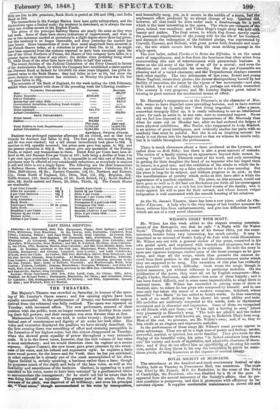WILSON'S NIGHT WITH SCOTT.
Mr. Wilson has this week added to the elegant evening entertain- ments of the Metropolis, one that he calls " A Night with Sir Walter Scott." Though this resembles some of his former titles, yet the enter-
tainment, besides being very interesting, has much novelty. It may be described as an account of Scott's Lady of the Lake with vocal illustrations. Mr. Wilson sets out with a general review of the poem, conceived in his own genial spirit, and expressed with warmth and eloquence, but at the same time sound and discriminating in its criticism. He tells the story in terse and vigorous language, recites some of the finest passages as he goes along, and sings all the songs, which thus preserve the interest de- rived from their position in the poem and the circumstances under which they are supposed to be sung. The execution of this plan has evidently been attended with much difficulty. Scott wrote the songs, though in lyrical measures, yet without reference to particular melodies. On the publication of the poem, they were all set by English composers--Maz- zmghi, Clarke, Stevenson, and others—but none of them happily; and it has been found difficult, and in some cases impracticable, to adapt them to national tunes. Mr. Wilson has succeeded in joining some of them to Scottish airs; to others he has given airs composed by himself; and in one case only has taken the music of a modern composer, Schubert, whose beautiful " Ave Maria " he has united to Scott's words. In thus executing a task of no small delicacy be has shown his usual ability and taste. His melodies are uniformly congenial to the words, both in rhythmical movement and in character and expression. Some of them we recognized as old friends with new faces,—as " I hae laid a herring in saut," joined very pleasantly to Blanche's song, " The toils are pitch'd and the stakes are set"; and another well-known air, sung to Roderick Dhu's boat-song. Most of the rest, we presume, are Mr. Wilson's own; and, if so, they du him credit as an elegant and expressive melodist. In the performance of these songs Mr. Wilson's vocal powers appear to great advantage. They are all in a high tone of poetry and feeling; tender, sorrowful, martial, or spirited, but never familiar. They give room for the display of his beautiful voice, his notes "in linked sweetness long drawn out," his variety and truth of expedistio'n,.and admirable clearness of elocu- tion; and if they do not afford him an oppohhtfiti rof showing his comic vein, neither do they throw in his way the temptatt9 kpiy,hich he some- times yields, of being humorous at the expense of musical,h4y.


























 Previous page
Previous page